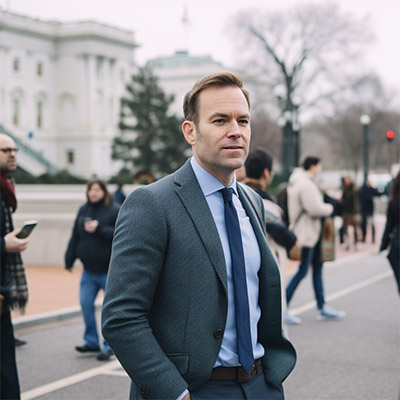
CEO
Will AI replace CEOs?
CEOs aren't the most popular people in the world, let's be honest. They earn more than... everyone, and are the person who makes the decisions that affect everyone else's lives - firing thousands of people with a single click, or changing working conditions that have far reaching impacts on workers and their families. In the age of artificial intelligence, this popularity (or lack of it...) is unlikely to change very much. After everyone else has been fired, they may just be the last employee standing.
The Single Employee Company
In a futuristic world where AI assistants and androids serve every role in a company, we might just see the emergence of the single employee corporation. In this model, a CEO could be reported to by AI vice-presidents, who are reported to by AI managers, who in turn are served by AI staff.
For shareholders this may be music to their ears... profit margins go through the roof as employees and offices disappear, and all but the raw input costs remain. The CEO would make the ultimate decisions, while AI systems manage everything else. Corporate tax rates (hopefully) go through the roof in this scenario, to fund the government's inevitable need to pay everyone Universal Basic Income (UBI).
The CEO would be left to focus on guiding the company's strategic direction, and answering to shareholders and government. A Black Mirror type prospect indeed.
The Super Dashboard
In this scenario, the idea of a traditional hierarchical structure, with every role as AI, would really only serve to provide familiarity to those CEOs around from before the AI transition (BAI?). Another model might do away with the traditional hierarchical structure. Instead, the CEO would simply be served by a single digital assistant, that provides all the information and suggestions to guide the company, and asks the CEO to make high-level decisions.
This AI assistant would thus be the CEOs consigliere, constantly analyzing data, identifying trends and emerging issues, and presenting recommendations. The CEO would then use this information to make his or her decisions.
Multiplicity: The cloned CEO
In another futuristic scenario, the CEO might create multiple digital twins of themselves to be 'everywhere in the company all at once'. These cloned CEOs could handle various tasks in parallel, while the original human CEO retains control. If you can train an AI model on every communication you've ever sent, every piece of information you've ever received, and every possible piece of information about a company, its industry and competitors, it becomes trivial to replicate that, multiple times.
This concept of a "cloned CEO" would thus enable the leader to be omnipresent. The CEO(s) would have a real-time understanding of everything happening within the organization.
In this case, why keep the CEO?
If we've reached the freaky deaky (and frankly terrifying) stage outlined above, you'd be remiss not to think... why is the CEO even needed?
Companies in the future will need to be held accountable for their actions - they'll have to answer to shareholders, the board, as they do now, regulatory bodies and the public, and be prepared to fall on their sword when things go awry.
Take the famous Ford Pinto case of the 1970's. The company's decision to release a car with a dangerous fuel tank design led to many people dying, a public relations disaster, and numerous lawsuits. There are countless other examples where companies screwed up bigly, and were hauled before regulators to explain. A CEO is needed to take responsibility for a company's actions, try to repair its image, and restore public trust. No AI could ever do this.
So AI systems, while powerful, lack the empathy and (sharp breath...) moral compass, needed to navigate complex ethical situations, making it impossible for AI to take on this responsibility. You could argue however that if the CEO has already fired everyone else, their moral compass is already shot.
Negotiation and Building Relationships
Returning to more traditional 'human' skills, a CEOs job involves negotiating with clients, partners, and regulators. These negotiations rely on building trust, rapport, and understanding the other party's interests and motivations. AI may excel at data analysis, and providing useful information to consider, but it is hardly equipped to manage the intricacies of human emotions and rapport building, that are so crucial in face-to-face discussions.
CEOs must forge strong relationships with stakeholders. Building these connections requires empathy and authenticity—qualities that AI cannot replicate. The interpersonal skills of a CEO are thus often critical to ensuring the long-term success of a company.
CEOs as AI Orchestrators
As AI takes on more roles within organizations, the CEOs function will shift towards orchestrating a group of human and AI resources. This will involve making critical decisions about the deployment of AI, ensuring these systems align with the company's vision and values, and addressing ethical and regulatory concerns.
A CEOs ability to collaborate with AI systems will be crucial in the era of few-employee companies. They must strike a balance between leveraging AI capabilities for data analysis and decision-making support while maintaining the human factor.
Adaptability and Experience
The business world is always changing, and CEOs bring to a company a unique range of business and life experience. They make decisions based on that knowledge and experience, and occasionally simply a hunch. They'll need to use all that experience and more to navigate the formidable challenges of AI.
While AI can be programmed to respond to specific situations, it lacks the ability to learn from human experience and apply that knowledge to an entirely new context. The capacity for abstract thinking and learning from past experiences is a unique human trait that sets CEOs apart from AI.
The CEO in an AI-Driven World
In conclusion, while AI will undoubtedly play a significant role in the future of business, the job of a CEO remains extremely safe. It is the CEOs unique blend of leadership, interpersonal skills, adaptability, and accountability, that sets them apart from artificial intelligence systems.
In a world increasingly dominated by AI, the human touch of a CEO will endure.
Conclusion: Extremely Safe | Time Period: Indefinitely


